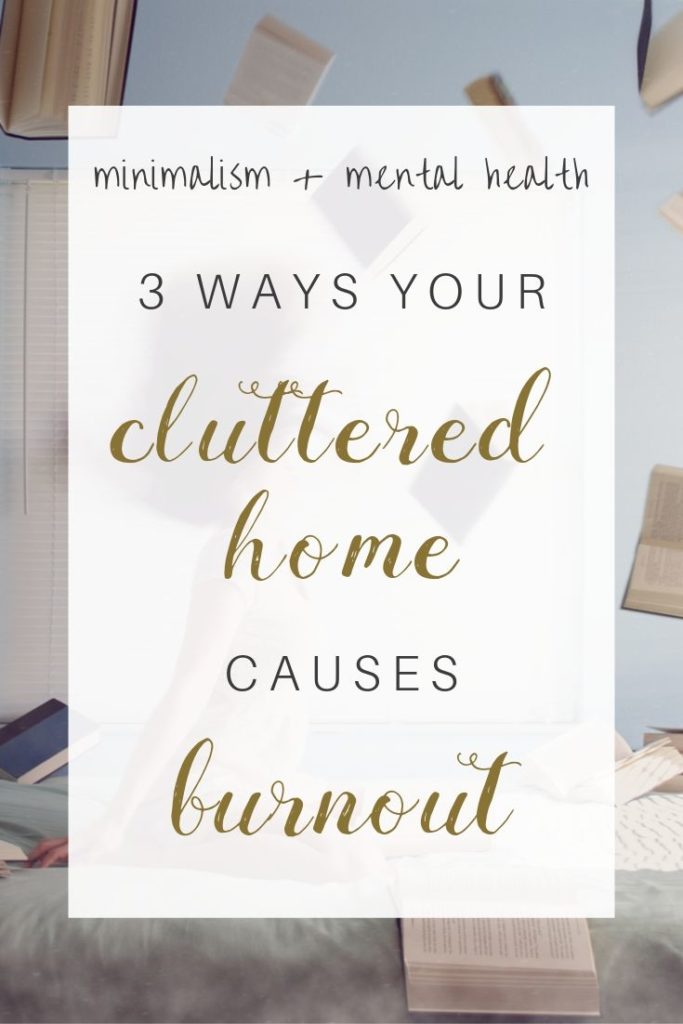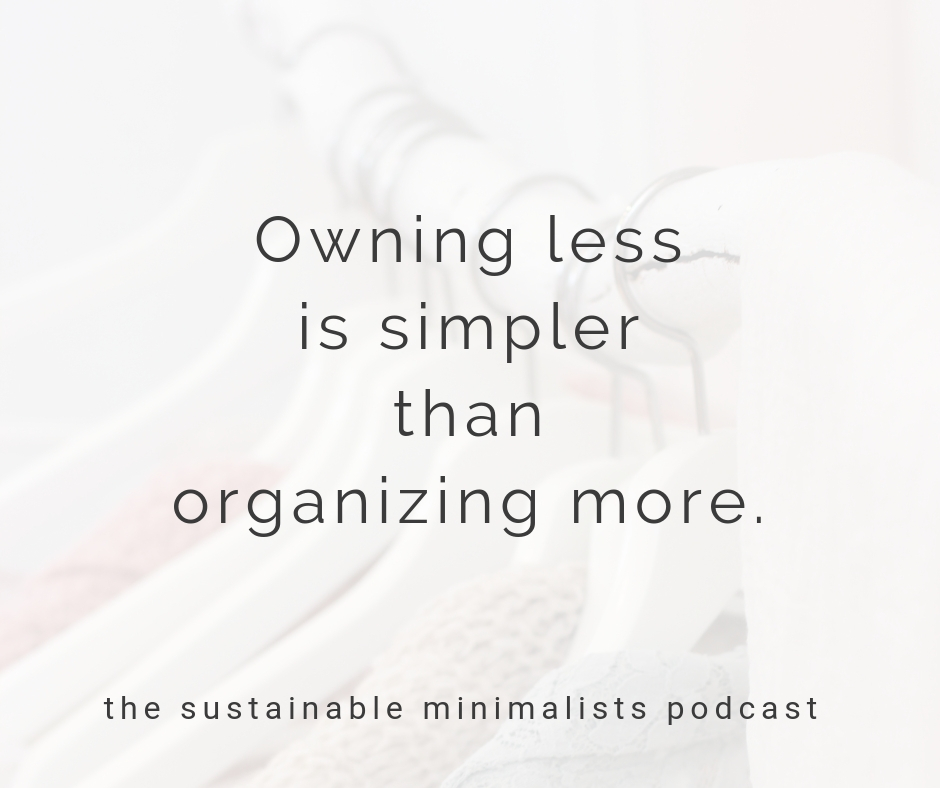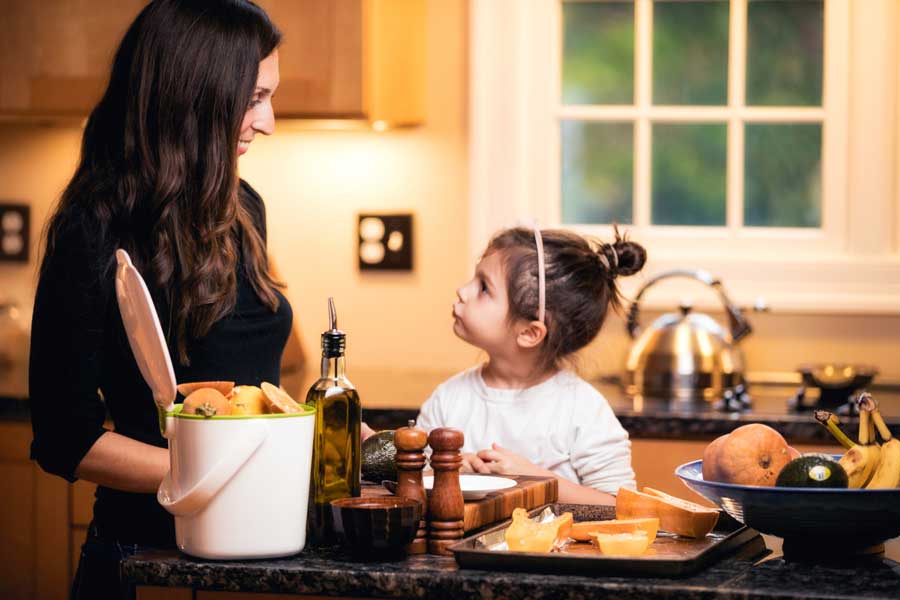3 Ways Clutter and Mental Health Intersect
Note: This is a guest post by blogger Kelsie Bentley.
A cluttered home negatively affects mental health.
We hope if we just “get more organized” we will have the solution to all of our problems, so we:
- Purchase an expensive set of bins to separate our craft supplies or shoes, and
- Drop money on a planner to help us make sense of our schedules so we have time to work on our homes.
But this new stuff just sits around as more clutter, untouched after the first week of use.
The result is a constant, treadmill-like feeling that we can’t keep up with our obligations, our homes or our stuff.
We are left wanting to throw our hands in the air + give up.
But when we understand the link between clutter and mental health, it becomes easier to find the motivation for change.
Here are 3 ways clutter causes burnout:
Clutter and mental health: The never-ending to-do list
_____
Take a look around. What are your surroundings like?
Our homes should fill us with peace, calm + clarity; it’s our haven, after all! But is that how our homes really makes us feel?
Or do we look around + see:
- Mail-order boxes or piles of regular mail we haven’t opened,
- Half-finished projects that make us feel guilty every time we notice them, and
- Possessions we were too lazy to make the effort to put away in the moment.
Every item sitting around our cluttered homes creates mental clutter in our brains. Clutter provides us with a never-ending to-do list, including:
“I really need to sort through that pile of mail. But then I will have to go through the junk + see which mailers I can cancel. I just don’t have time for that right now, so I will have to get to it later.”
“I need to order the canvases for the wall. Canvases are expensive; I don’t have the endurance to search for coupon codes right now. I’ll get to it later.”
“I really need to put this drill put away, but I’ll probably need it later for something, so I will just let it sit here.”
Here’s how clutter + mental health intersect: Every time we see clutter we are reminded of all the items on our To-Do lists.
These incessant reminders zap our energy + lead us closer to burnout.
Clutter + decision fatigue: The ultimate foe of mental health
_____
You know that feeling when you walk into a store hungry? Me too.
When I’m hungry, chances are pretty good I’m NOT going to be sticking to my grocery list for the day.
Chances are even better the additional items added to my cart are unhealthy.
This happens because of decision fatigue.
The more decisions we have to make, the poorer our decision-making skills become. This is decision fatigue.
Another way of saying this would be, when I walk into a store + I’m tired or hungry, there’s a better chance of me coming home with pizza + cheesecake than there is of me coming home with kale + quinoa.
Decision fatigue doesn’t just apply to grocery shopping.
We have decisions to make about every single possession in our homes as well as each and every obligation on our schedules.
If we’re wasting time trying to rearrange a kitchen drawer full of gadgets so they all fit, our ability to make a quality decision later in the day is diminished.
When we have to dig through a giant basket of unmatched socks to find a matching pair, we use up some of our finite decision-making energy on a low-level task.
We won’t have that energy to use on something more important later in the day.
A cluttered home can be mentally taxing to navigate. Over time, this limits our ability to make quality decisions, leading us to feel worn down + burnt out.
Clutter robs us of what matters
_____
A cluttered home steals more than our ability to make quality decisions. It takes other things away from us, too, including:
– Time we could spend with loved ones;
– Money we could have spent on other things
– Our social life
Time
Every item we bring into our homes has to be dealt with. It may require regular cleaning or maintenance to stay in working order. Possessions must be dusted, rearranged, dry cleaned, given annual tune-ups or more, too.
When it comes time for disposal, it takes time to find worthy recipients for donation or for responsible recycling of our now unwanted possessions.
All these tasks eat away at our free time.
Money
Have you ever had a garage sale + tried to resell something? What kind of return did you get on that item? Fifty percent of the original value? Twenty percent?
While sometimes the items we end up later selling were necessary at one point (especially in the case of children who seem to need a full wardrobe each season + toys appropriate for their ever-changing intellectual needs) all of the other, unnecessary items that we eventually sold or donated used to be dollars.
Our possessions used to be dollars we worked to earn.
Social Life
Clutter can impact our social lives.
I grew up in a cluttered home. If the doorbell rang or if we got a phone call that someone was on their way over it was a mad rush to hide the cluttered mess that was around the house.
“Quick! Shove those blankets behind the couch!”
“Hurry up, grab those toys + take them to your room!”
“It’s fine, just don’t let them past the entryway!”
Living in cluttered homes makes us less welcoming to our friends + family.
Clutter steals the opportunity for spontaneity + ultimately leaves us feeling like failures, too.
Improve clutter and mental health simultaneously
_____
By tackling our cluttered homes, we alleviate our mental burdens. Here’s your action plan:
1. Be realistic
Our cluttered homes didn’t get cluttered in one day, one week, or even one month, so it would be foolish to assume we can clean them up in a short amount of time.
Know that whole-house declutters can take up to a year to complete. Play the long game + know that slow + steady always wins the (decluttering) race.
2. Start very small
If the thought of clearing clutter is daunting, choose one small area to work on, such as a single cabinet or drawer.
Then set a timer for 10 or 15 minutes +just work for that amount of time.
This small success will motivate you to do more.
Try the Shoebox Method of daily decluttering that takes just 15 minutes.
3. Have an action plan
Did you sort your unwanted possessions into 6 bags for donation + 2 bags for recycling but they’ve sat in the trunk of your car for months? If so, you haven’t actually decluttered.
You’ve just rearranged your clutter.
Make sure to schedule time to properly dispose of your unwanted possessions after a decluttering session.
4. Understand your limits
If you have sentimental clutter, practice first on less-challenging clutter (clothing, dishes + mugs, paper clutter) + work up to your more daunting, nostalgic possessions.
Need some motivation? Make decluttering fun so you stay on course.
5. Reward yourself
And I don’t mean by buying something!
Invite a couple of friends over. Host Book Club or another other small group as a reward to reignite your social life in your new, uncluttered home.
Alternately, go out to your favorite restaurant or see a movie or play. Reward yourself for your hard work in ways that don’t add unnecessary clutter to your newly-tidied home.
Summary
_____
We often don’t realize we have a clutter problem until our clutter affects our mental health.
The good news is that it’s possible to improve clutter + reduce burnout simultaneously. Be realistic about what you can accomplish, start small, create an action plan, understand your limits + create a reward system that doesn’t involve buying more stuff.
Choosing to turn your cluttered home into a relaxing, decluttered sanctuary will take work, but the mental health benefits that come along with decluttering will make the hard work worth it.
Kelsie Bentley is a self care and personal development blogger. She got her unlikely start after nearly a decade of meeting struggling, burnt-out women from behind the chair as a hairstylist. Kelsie’s keen sense of observation, empathic nature + an insatiable desire to help others led her to the online world to teach women that caring for themselves is the key to living the fulfilled lives they dream of. She can be found on Facebook, Instagram + Pinterest.
Stay in-the-know!
Sign up for monthly minimalist inspiration.



